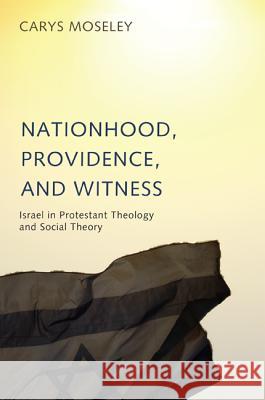Nationhood, Providence, and Witness: Israel in Protestant Theology and Social Theory » książka
Nationhood, Providence, and Witness: Israel in Protestant Theology and Social Theory
ISBN-13: 9781610979429 / Angielski / Miękka / 2013 / 267 str.
Nationhood, Providence, and Witness: Israel in Protestant Theology and Social Theory
ISBN-13: 9781610979429 / Angielski / Miękka / 2013 / 267 str.
(netto: 135,79 VAT: 5%)
Najniższa cena z 30 dni: 141,03
ok. 16-18 dni roboczych.
Darmowa dostawa!
Description: This book argues that problems with recognizing the State of Israel lie at the heart of approaches to nationhood and unease over nationalism in modern Protestant theology, as well as modern social theory. Three interrelated themes are explored. The first is the connection between a theologian's attitude to recognizing Israel and their approach to the providential place of nations in the divine economy. Following from this, the argument is made that theologians' handling of both modern and ancient Israel is mirrored profoundly in the question of recognition and ethical treatment of the nations to which they belong, along with neighboring nations. The third theme is how social theory, represented by certain key figures, has handled the same issues. Four major theologians are discussed: Reinhold Niebuhr, Rowan Williams, John Milbank, and Karl Barth. Alongside them are placed social theorists and scholars of religion and nationalism, including Mark Juergensmeyer, Philip Jenkins, Anthony Smith, and Adrian Hastings. In the process, debates over the relationship between theology and social theory are reconfigured in concrete terms around the challenge of recognition of the State of Israel as well as stateless nations. Endorsements: "Here is a lively study of nationhood . . . that] will undoubtedly raise hackles, provoke discussion and dissent, and require the unpersuaded to examine her arguments and cited texts with great care. Here is swashbuckling, stimulating theology, which should be carefully studied not only by theologians, but by people of many faiths, political and social theorists, and ethicists."-Alan P. F. Sell, Milton Keynes, United Kingdom "Nationalism and the concept of nationhood is something Christian theologians have shied away from. The tragedy of the Holocaust, the European experience during the twentieth century, and the fractious state of the Middle East during the twenty-first have given us all pause for thought. On the basis of a fresh understanding of Israel, Moseley tackles negative attitudes toward the integrity of stateless nations and suggests creative ways in which current missiology and theological ethics can respond positively."-D. Densil Morgan, Professor of Theology, University of Wales Trinity Saint DavidAbout the Contributor(s): Carys Moseley studied Classics and Theology at the Universities of Cambridge, Oxford, and Edinburgh, and has taught Theology and Christian Ethics at the University of Edinburgh. She is the author of Nations and Nationalism in the Theology of Karl Barth (forthcomin
Description:This book argues that problems with recognizing the State of Israel lie at the heart of approaches to nationhood and unease over nationalism in modern Protestant theology, as well as modern social theory. Three interrelated themes are explored. The first is the connection between a theologians attitude to recognizing Israel and their approach to the providential place of nations in the divine economy. Following from this, the argument is made that theologians handling of both modern and ancient Israel is mirrored profoundly in the question of recognition and ethical treatment of the nations to which they belong, along with neighboring nations. The third theme is how social theory, represented by certain key figures, has handled the same issues. Four major theologians are discussed: Reinhold Niebuhr, Rowan Williams, John Milbank, and Karl Barth. Alongside them are placed social theorists and scholars of religion and nationalism, including Mark Juergensmeyer, Philip Jenkins, Anthony Smith, and Adrian Hastings. In the process, debates over the relationship between theology and social theory are reconfigured in concrete terms around the challenge of recognition of the State of Israel as well as stateless nations. Endorsements:"Here is a lively study of nationhood . . . [that] will undoubtedly raise hackles, provoke discussion and dissent, and require the unpersuaded to examine her arguments and cited texts with great care. Here is swashbuckling, stimulating theology, which should be carefully studied not only by theologians, but by people of many faiths, political and social theorists, and ethicists."-Alan P. F. Sell, Milton Keynes, United Kingdom "Nationalism and the concept of nationhood is something Christian theologians have shied away from. The tragedy of the Holocaust, the European experience during the twentieth century, and the fractious state of the Middle East during the twenty-first have given us all pause for thought. On the basis of a fresh understanding of Israel, Moseley tackles negative attitudes toward the integrity of stateless nations and suggests creative ways in which current missiology and theological ethics can respond positively."-D. Densil Morgan, Professor of Theology, University of Wales Trinity Saint DavidAbout the Contributor(s):Carys Moseley studied Classics and Theology at the Universities of Cambridge, Oxford, and Edinburgh, and has taught Theology and Christian Ethics at the University of Edinburgh. She is the author of Nations and Nationalism in the Theology of Karl Barth (forthcoming).











